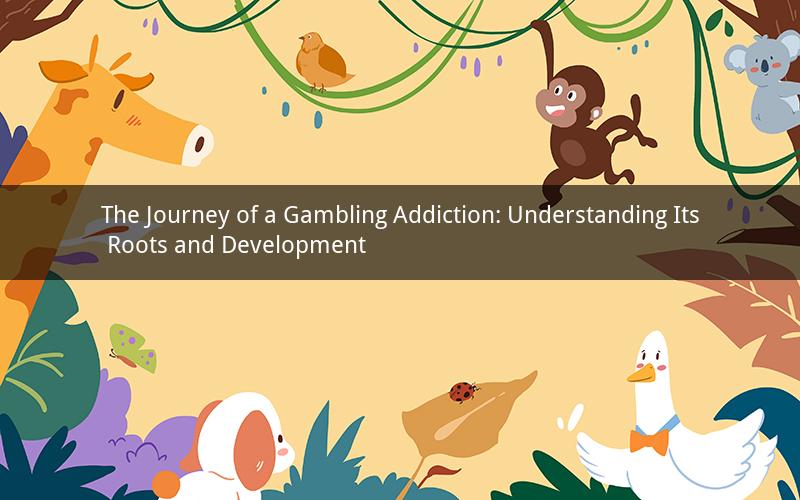
Gambling addiction is a complex issue that affects millions of people worldwide. Understanding how it starts is crucial in addressing this problem effectively. This article delves into the factors that contribute to the development of a gambling addiction, exploring the psychological, social, and environmental aspects involved.
1. Psychological Factors
The development of a gambling addiction often starts with psychological factors. People who are prone to addiction may be more susceptible to the allure of gambling. Here are some key psychological factors that play a role in the formation of a gambling addiction:
a. Dopamine and the brain's reward system: When a person wins at gambling, their brain releases dopamine, a neurotransmitter that creates feelings of pleasure and satisfaction. This reward system can lead to a reinforcing cycle, making individuals crave more gambling experiences.
b. Stress and anxiety: People who are under high levels of stress or anxiety may turn to gambling as a way to cope. The thrill of gambling can provide temporary relief from negative emotions, leading to the development of an addiction.
c. Impulsivity and thrill-seeking: Individuals who have a higher tendency to seek thrill and take risks may be more susceptible to developing a gambling addiction. The adrenaline rush and excitement associated with gambling can be irresistible for these individuals.
2. Social Factors
Social factors also contribute to the development of a gambling addiction. The following aspects highlight the role of social interactions and environments:
a. Peer influence: Individuals who have friends or family members who gamble may be more likely to develop a gambling addiction. Seeing others enjoy gambling can trigger the desire to experience the same excitement.
b. Socializing at casinos: Visiting casinos with friends or family can increase the likelihood of developing a gambling addiction. The social atmosphere, the availability of gambling opportunities, and the sense of community can contribute to the formation of an addiction.
c. Marketing and advertising: The gambling industry invests heavily in marketing and advertising campaigns. The glamorous portrayal of gambling in media and the portrayal of winners as successful and glamorous can attract individuals to try their luck, potentially leading to addiction.
3. Environmental Factors
Environmental factors also play a significant role in the development of a gambling addiction. The following aspects highlight the impact of the environment:
a. Accessibility: The ease of accessing gambling venues, such as casinos or online platforms, can contribute to the development of an addiction. When gambling is readily available, individuals may be more likely to engage in it frequently.
b. Convenience: Online gambling platforms offer convenience, allowing individuals to gamble from the comfort of their homes. This ease of access can lead to increased exposure to gambling opportunities, making it easier to develop an addiction.
c. Cultural norms: In some cultures, gambling is considered a normal form of entertainment. This acceptance of gambling can create an environment where individuals may be more likely to engage in gambling without realizing the potential risks.
Frequently Asked Questions (FAQs)
1. How can I recognize the signs of a gambling addiction in myself or someone else?
Ans: Signs of a gambling addiction include an increasing amount of time spent on gambling activities, neglecting responsibilities, experiencing financial difficulties, feeling anxious or irritable when unable to gamble, and lying about gambling behavior.
2. Can a person develop a gambling addiction without any previous history of addiction?
Ans: Yes, a person can develop a gambling addiction without any previous history of addiction. The combination of psychological, social, and environmental factors can lead to the development of an addiction even in individuals who have never struggled with addiction before.
3. Is there a cure for gambling addiction?
Ans: There is no one-size-fits-all cure for gambling addiction. Treatment options may include therapy, support groups, medication, and lifestyle changes. The most effective approach often involves a combination of these strategies.
4. Can gambling addiction be prevented?
Ans: Yes, gambling addiction can be prevented by understanding the risks associated with gambling, making informed decisions, and establishing healthy boundaries. Educating oneself about responsible gambling practices can help reduce the likelihood of developing an addiction.
5. How can I support someone who is struggling with a gambling addiction?
Ans: Supporting someone with a gambling addiction involves being empathetic, offering a listening ear, encouraging them to seek professional help, and being there for them during their recovery journey. It's important to avoid enabling their behavior and to seek support for yourself as well.
In conclusion, the development of a gambling addiction is a complex process influenced by psychological, social, and environmental factors. Understanding these factors is crucial in addressing and preventing this issue. By recognizing the signs of addiction, seeking appropriate treatment, and promoting responsible gambling practices, we can help individuals overcome this challenging problem and lead healthier lives.